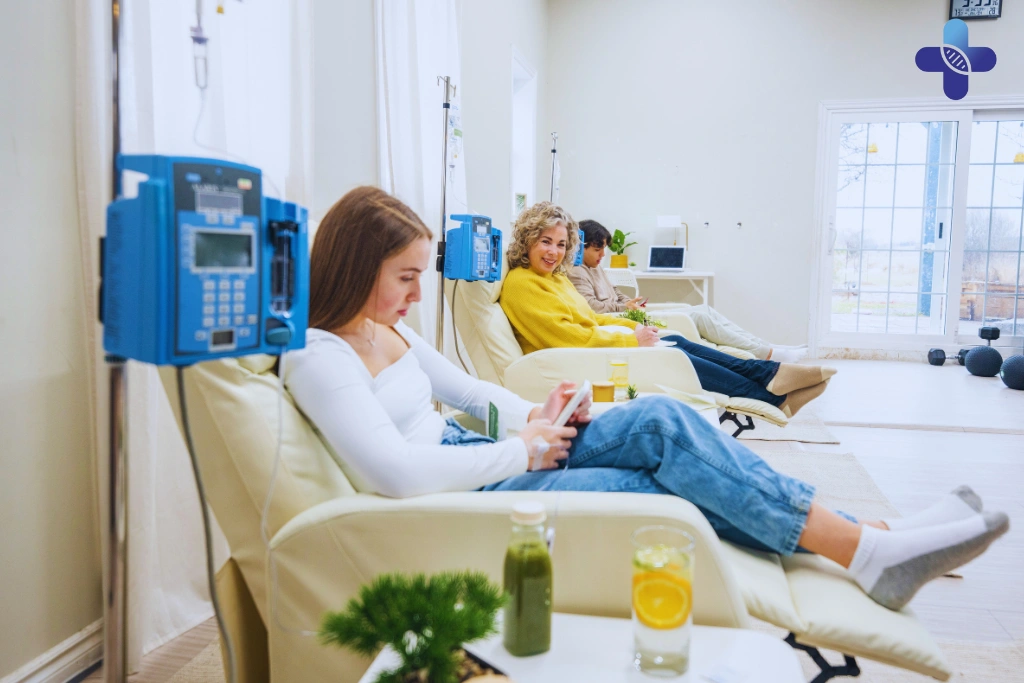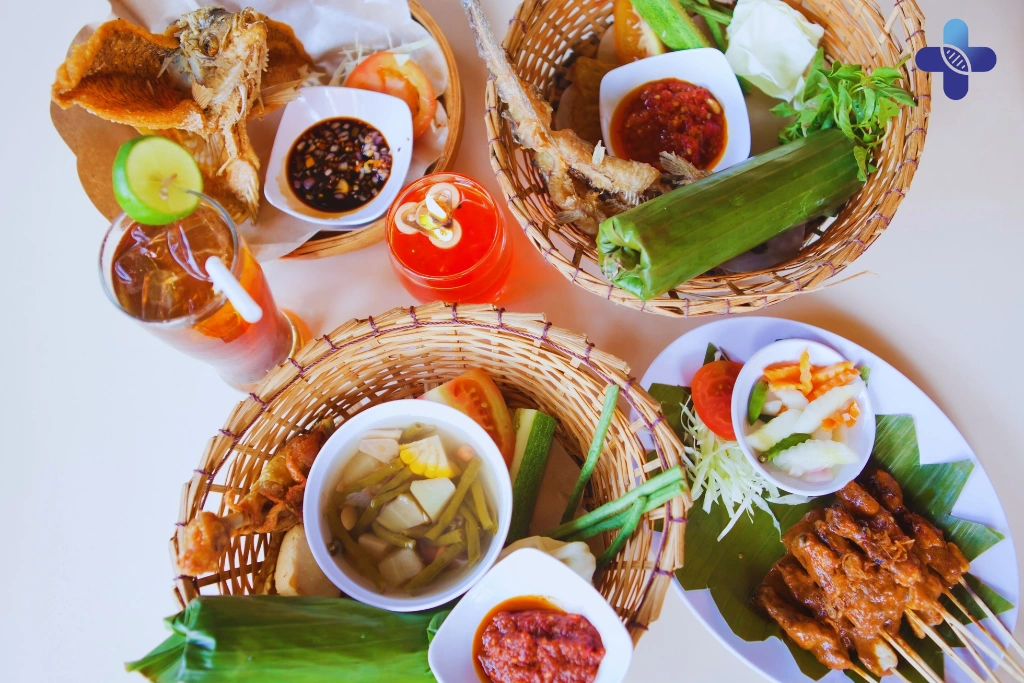Experiencing sudden stomach issues while traveling can be alarming, especially when you’re unsure whether it’s Bali Belly or food poisoning. Though often used interchangeably, these conditions have different causes, symptoms, and timelines. In this article, Life Everyouth, a trusted Medical Clinic in Bali, explains the key distinctions to help travelers recognize what they’re dealing with and how to treat it effectively. Whether you’re staying near Seminyak or Ubud, our Bali Medical Clinic offers clear guidance and fast solutions to get you back on your feet.
Bali Belly vs. Food Poisoning: A Doctor Explains How to Tell the Difference

You’re sick in Bali. Was it the grilled prawns from lunch, or just an unlucky bug from last night’s smoothie? Many travelers confuse Bali Belly with food poisoning, but understanding the subtle differences between the two can help you respond more confidently.
In this guide from Life Everyouth Bali, a trusted Medical Clinic in Bali, we’ll help you decode your symptoms, from the timing of your stomach cramps to the likely source of your illness. Whether it’s Bali Belly or food poisoning, one truth remains: your body is losing fluid fast. And at our Bali Medical Clinic, we’ll show you the smartest step to recover before your trip is completely ruined.
Let’s break it down—clearly, calmly, and medically.
Defining the Terms: What Are We Really Talking About?
When travelers fall ill during their Bali trip, they often hear two terms thrown around: Bali Belly and food poisoning. But what do these terms actually mean? Understanding the differences between these digestive diseases in Bali can help you decide when and how to seek care from a trusted Medical Clinic in Bali, like Life Everyouth Bali.
Bali Belly (Traveler’s Diarrhea)
Bali Belly is a common term used to describe gastroenteritis in Bali, a condition that usually stems from ingesting unfamiliar bacteria such as Enterotoxigenic E. coli (ETEC) or viruses like norovirus. For many travelers, their immune system isn’t prepared for the local microbial environment, making them more susceptible to these foreign pathogens. It often develops 12 to 72 hours after exposure and presents with symptoms like abdominal cramps, watery diarrhea, fatigue, and mild fever.
At Life Everyouth, a dedicated Medical Clinic in Bali, we frequently treat cases of Bali Belly with swift, non-invasive care, prioritizing hydration and electrolyte balance. Our team at Bali Medical Clinic understands the urgency of treating travel-related illness without disrupting your plans.
Acute Food Poisoning
On the other hand, food poisoning in Bali typically results from eating contaminated food containing bacterial toxins. These toxins are often produced by organisms like Staphylococcus aureus or Bacillus cereus, and can cause symptoms to appear within just 1 to 8 hours after ingestion. The onset is usually sudden and severe, with intense vomiting, nausea, and sometimes abdominal pain.
While the symptoms may feel different from Bali Belly, the recovery path starts the same way—rehydration. At Life Everyouth Bali, we recognize that digestive diseases in Bali, whether viral or toxin-based, demand fast action. That’s why our Medical Clinic in Bali offers tailored IV Drip Therapy for both rapid relief and long-term recovery at our Bali Medical Clinic branches.
The Key Differences: A Comparison Table
Understanding whether you’re experiencing Bali Belly vs food poisoning in Bali can be difficult, especially when symptoms overlap. At Life Everyouth Bali, we help patients daily at our Medical Clinic in Bali determine what they’re dealing with and how to treat it effectively. Use the table below to spot the key distinctions between these two common digestive diseases in Bali.
| Aspect | Bali Belly (Traveler’s Diarrhea) | Food Poisoning (Acute Toxic Reaction) |
| Primary Cause | Bacteria or viruses unfamiliar to your system (e.g., E. coli) | Pre-formed toxins from bacteria (e.g., Staphylococcus) |
| Onset Time | 12 to 72 hours after exposure | Rapid: often within 1 to 8 hours |
| Early Symptoms | Abdominal cramps, watery diarrhea, mild fever | Sudden, intense vomiting, nausea, sometimes cramps |
| Duration | 2 to 5 days if untreated | Often resolves in under 24 hours |
Regardless of the diagnosis, Life Everyouth, your trusted Bali Medical Clinic, emphasizes that both conditions can cause serious fluid loss. Don’t wait until dehydration takes over—visit our Medical Clinic in Bali for fast, evidence-based care.
The Most Important Similarity: The Danger of Dehydration

When comparing Bali Belly vs food poisoning, the outcome is often more similar than people expect—rapid fluid loss. Whether triggered by unfamiliar bacteria and viruses in Bali Belly or toxins from contaminated food in food poisoning in Bali, vomiting and diarrhea quickly drain water and essential electrolytes. At Life Everyouth Bali, we frequently treat patients who underestimate how fast mild stomach issues can escalate into serious dehydration.
In the Bali Belly vs food poisoning scenario, your digestive system reacts by flushing out harmful substances, but this defense also strips the body of sodium, potassium, and other vital minerals. Without prompt care from a trusted Medical Clinic in Bali, symptoms like dizziness, fatigue, muscle cramps, or worsening weakness can appear fast. That’s why Life Everyouth Bali focuses on early intervention—our Bali Medical Clinic delivers fast rehydration solutions that work more effectively than oral fluids, helping your body recover safely before dehydration becomes severe.
The Universal Solution: Rapid Rehydration is Your Priority
At Life Everyouth Bali, we know how confusing digestive diseases in Bali can be—especially when you’re trying to figure out Bali Belly vs food poisoning. The symptoms often feel identical: nausea, vomiting, diarrhea, cramps, and extreme fatigue. The truth is, regardless of whether it’s Bali Belly or food poisoning, the biggest danger is dehydration. Drinking water helps, but when your stomach can’t keep fluids down, oral hydration alone is often not enough to support proper recovery.
As a trusted Medical Clinic in Bali, Life Everyouth Bali provides the Bali Belly & Dehydration Recovery IV Drip, designed to treat both sides of the Bali Belly vs food poisoning problem. This IV therapy bypasses your irritated digestive system and delivers fluids, electrolytes, and supportive nutrients directly into your bloodstream for faster absorption and faster relief. Whether you’re staying in Uluwatu, Seminyak, or Ubud, our Bali Medical Clinic is ready to help you recover efficiently. Don’t wait until dehydration gets worse—book your Bali Belly IV Drip Bali today and get your strength back safely and quickly.
Conclusion Bali Belly vs. Food Poisoning: How to Tell the Difference (2025)

Knowing whether you’re dealing with Bali Belly or food poisoning in Bali can offer helpful context, but it shouldn’t be your main concern when you’re already sick. At Life Everyouth Bali, we’ve treated countless travelers who tried to self-diagnose and waited too long—only to end up more dehydrated and exhausted.
The priority isn’t labeling your symptoms, but treating the underlying fluid loss that both conditions cause. As a leading Medical Clinic in Bali, Life Everyouth provides fast, effective rehydration through IV Drip therapy that works regardless of the cause. When it comes to digestive diseases in Bali, trust the team at our Bali Medical Clinic to get you back on your feet—safely, quickly, and professionally.
Frequently Asked Questions (FAQ) Bali Belly vs. Food Poisoning: How to Tell the Difference (2025)
So, what is the most common cause of Bali Belly?
The most common cause of Bali Belly in Bali is a strain of bacteria known as Enterotoxigenic Escherichia coli (ETEC). This specific type of E. coli is prevalent in developing countries and differs from the strains your immune system is used to back home. When foreign bacteria or viruses enter your digestive tract, your body reacts with diarrhea, cramps, and fatigue. At Life Everyouth Bali, a trusted Medical Clinic in Bali, we see this condition frequently in travelers during their first few days on the island, especially after consuming local food or drinks without adequate adaptation.
Can I get food poisoning from a high-end, expensive restaurant in Bali?
Yes, even five-star restaurants are not completely immune to food poisoning in Bali. While the risk is generally lower due to better hygiene protocols, improper food handling, poor temperature control, or contaminated ingredients can still lead to outbreaks. Contaminated mayonnaise, undercooked seafood, or reheated rice can carry dangerous toxins. At Life Everyouth, our experience as a Bali Medical Clinic shows that many cases occur despite appearances of cleanliness. We advise always trusting your senses—if something smells or tastes off, don’t eat it.
How can I know for sure which one I have—Bali Belly or food poisoning?
The only definitive method to distinguish between Bali Belly and food poisoning in Bali is through a laboratory stool test. However, this is often unnecessary. Most cases are treated symptomatically, especially when dehydration is the main concern. Since both illnesses present similarly—nausea, vomiting, diarrhea—the focus at Life Everyouth, a reliable Medical Clinic in Bali, is to stabilize the patient and begin hydration immediately. Lab tests are generally reserved for prolonged or severe symptoms.
Should I make myself vomit if I suspect I have food poisoning?
No, inducing vomiting can do more harm than good. If your body is already reacting to toxins, forced vomiting may increase the risk of esophageal tears, electrolyte imbalance, and severe dehydration. Instead, start by sipping water or oral rehydration solution (ORS) in small amounts. If vomiting continues and you’re unable to retain fluids, the best option is to visit Life Everyouth Bali, where our Bali Medical Clinic offers IV Drip Therapy that bypasses your digestive system entirely, delivering fluids and nutrients directly into your bloodstream.
Do I need antibiotics for Bali Belly or food poisoning?
In most cases, no. Many instances of Bali Belly in Bali are caused by viruses or bacteria that resolve without antibiotics. Antibiotic misuse can cause resistance or disrupt your gut flora further. At Life Everyouth, our doctors only prescribe antibiotics after assessing your full condition and, if necessary, confirming a bacterial infection that genuinely requires treatment. Our evidence-based approach at Medical Clinic in Bali ensures you get the safest and most effective care, without unnecessary medication.
Is the IV Drip treatment the same for both Bali Belly and food poisoning?
Yes. Whether you’re experiencing Bali Belly or food poisoning in Bali, the core problem is dehydration. IV Drip Therapy at Life Everyouth Bali is formulated to deliver isotonic fluids, electrolytes (like sodium and potassium), and supportive vitamins directly into your bloodstream. This bypasses the irritated digestive system, allowing for faster recovery. Our Bali Medical Clinic has helped hundreds of travelers recover within hours using this safe and proven method.
My friend and I ate the exact same meal, but only I got sick. Why?
Differences in gut microbiota, immunity, and even stress levels can explain this. One person may have a more robust digestive defense or may have simply avoided the contaminated portion of the meal. Additionally, even a minor lapse in hand hygiene can tip the balance. At Life Everyouth, we remind patients that digestive diseases in Bali don’t affect everyone equally. If you’re showing symptoms, don’t ignore them—seek care promptly at a Medical Clinic in Bali.
How can I prevent Bali Belly or food poisoning while traveling in Bali?
Preventing digestive diseases in Bali involves simple but crucial steps: always wash your hands with soap before eating, drink only bottled or filtered water, and be cautious with raw or street-prepared foods. Avoid ice in drinks unless you’re sure it comes from filtered water. Opt for busy restaurants with high turnover, which often indicates fresher food. If you do feel unwell, Life Everyouth Bali, a well-equipped Bali Medical Clinic, is ready to help with early treatment and preventive advice.
If my symptoms started just 30 minutes after eating, is it definitely food poisoning?
Very likely. A rapid onset of symptoms—within 1 to 2 hours—suggests you ingested a pre-formed bacterial toxin, such as those produced by Staphylococcus aureus or Bacillus cereus. These toxins cause sudden vomiting and nausea without needing time to incubate. This pattern is distinct from Bali Belly, which usually takes 12 to 72 hours to show up. At Life Everyouth, our Bali Medical Clinic uses your symptom timeline as one of the best diagnostic clues.
Is it safe to take anti-diarrhea pills like Loperamide (Imodium)?
Use them only under medical advice. While they can slow diarrhea and make travel more manageable, they also risk trapping harmful bacteria or toxins in your system longer, especially if you’re dealing with food poisoning in Bali. Loperamide should not be taken if you have fever or bloody stools. At Life Everyouth Bali, we provide case-by-case recommendations at our Medical Clinic in Bali, ensuring that treatment supports your recovery rather than prolonging your illness.
